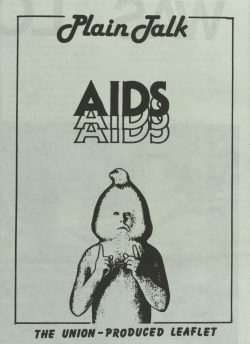From the archives: The forgotten story of AIDS and student life at Warwick
The year is 1984, and the world is gripped by fear over the emerging AIDS epidemic. Countless UK institutions seek to educate people about what would later be recognised as one of the most misconceived viruses in human history. That, in a nutshell, is pretty much what we’ve always been told about the AIDS outbreak. But strip the epidemic down to the university level, and what do you get? Narrow it down further to the University of Warwick, and what can you expect to see? Well, these are questions that Historian Joseph Price took upon himself to answer.
Price, a recent graduate from Warwick’s Centre for the History of Medicine, recently uncovered a story that sheds light on how Warwick students navigated the AIDS epidemic with a mix of activism, apathy, and detachment. Leading him to win the 2023 Midland History Essay Prize, Price’s research delves into a largely forgotten chapter in the history of AIDS, revealing the complexities of student life – particularly for Warwick students.
“Unlike some universities, there wasn’t a lot of fear about AIDS at Warwick. I expected there to be fear all over campus, but it doesn’t appear to be the case.”
Joseph Price, PhD student at the University of Warwick
So where exactly does Warwick University have its place in all of this? Well, Joseph is eager to tell The Boar about one of the highlights of his research. “Unlike some universities, there wasn’t a lot of fear about AIDS at Warwick,” he says. “I expected there to be fear all over campus, but it doesn’t appear to be the case.”
What made Warwick unique, he speculates, is the University’s geographical and social isolation. Indeed, choosing to study at Warwick University is quite literally, as the old saying goes, ‘sending yourself off to Coventry’. That is, to be frank, sending yourself to the middle of nowhere. According to Price, back in the 80s, Warwick as a campus-based institution was insulated from the intense public health anxieties that gripped cities like London or Birmingham. “Perhaps it’s for this reason that we saw a student response that wasn’t too dissimilar to what it’d be like today,” Price suggests.
This relative claim is evident in old copies of The Warwick Boar, which first mentioned AIDS in 1984 in a letter to the editor that referenced the virus in a dismissive, almost flippant manner. By the time the epidemic reached its peak concern in the mid-to-late 1980s, The Boar had begun to feature more in-depth discussions about AIDS, but it never dominated the headlines. As Price pointed out, “It never made the front page either. It was always a feature towards the middle of the paper.” A bit like the feature you’re reading now, Price says this choice of placement suggests that although AIDS was acknowledged, it was never really seen as a pressing issue by the student body.

‘Plain Talk’ was a leaflet distributed by Warwick Students’ Union (SU) (Image: The Warwick Boar / Modern Records Centre, University of Warwick)
However, The Boar played a crucial role in giving out information about AIDS and sexual health. The newspaper published a variety of articles, including features on AIDS Awareness Week and the controversial Plain Talk leaflet distributed by the Students’ Union (SU) in 1987. These efforts reflect a campus that was trying to educate its students, even if the issue was not a priority for everyone. One of the more colourful aspects of Warwick’s AIDS awareness campaign was the introduction of the “Rubber Man” mascot, a personified condom featured in Plain Talk. The mascot was intended to symbolise the importance of safe sex, but it received mixed reactions from students. Some found it humorous, while others criticised it for trivialising a serious issue. Price reflects on this in his research article, noting that such mascots at other universities also faced backlash, which suggests a broader uncertainty about how to approach AIDS education in a way that was both effective and respectful.
“In 1988, it seems everyone just stopped talking about it. The Boar stopped writing about it, and there’s not much you can find beyond that point”
Joseph Price
Warwick’s response to AIDS was not solely characterised by indifference. There were moments of significant activism, particularly within the University’s Gay Society and the efforts surrounding the AIDS Awareness Weeks. The Gay Society, which had been a part of Warwick since the early 1970s, played a pivotal role in promoting sexual health and dispelling myths about AIDS, particularly within the LGBTQ+ community.
The AIDS Awareness Weeks, first held in January 1987, were notable for their comprehensive approach, including educational videos, lunchtime stalls, and discussions led by the SU’s Welfare Officer. These events were designed to engage the student body in a serious conversation about AIDS, but as Price’s research shows, the biggest challenge was sustaining student engagement.
“In 1988, it seems everyone just stopped talking about it. The Boar stopped writing about it, and there’s not much you can find beyond that point,” he says. This abrupt decline in discourse reflects a broader trend observed in the UK, where the initial urgency surrounding AIDS began to wane as the disease became perceived as a manageable, chronic condition rather than an immediate crisis.
One of the most memorable events from this period was the “Big Rubber Ball” held in November 1987, during AIDS Awareness Week. Headlined by Bronski Beat and featuring speakers from the Terrence Higgins Trust, the event was a blend of entertainment and education, designed to promote safe sex in a lively, engaging manner. Free condoms were handed out with every ticket, and the event’s success in raising awareness was matched by its financial contribution to AIDS research.
Yet, despite these efforts, the enthusiasm for such initiatives was short-lived. Attendance at sexual health events dwindled as the 1990s approached, a trend that Price links to a broader societal shift in attitudes towards AIDS. The excitement of the Big Rubber Ball, which initially broke even with its fundraising, was not enough to sustain long-term interest in the cause. “The discrepancies over advice and the failing attendance at sexual health events would only get worse as the 1990s approached,” Price notes, highlighting the challenges faced by those trying to keep the issue at the forefront of student consciousness.
By the early 1990s, it appears the conversation around AIDS at Warwick had largely faded. The formation of the HIV and AIDS Awareness Society (HAAS) in 1993 was an attempt to revive interest, but it struggled to gain traction. Poor attendance at meetings and a general sense of apathy among students suggested that the urgency of the late 1980s had dissipated. Price remains critical of this decline, seeing it as part of a broader failure to translate the lessons of the AIDS crisis into ongoing efforts to promote sexual health. “The lessons learnt from experiences like these aren’t very well translated now,” he says, pointing to the University’s contemporary issues with sexual health and wellbeing.
“I’d love there to be a 40th-anniversary event around the Big Rubber Ball, as I think Warwick still has a lot to do when it comes to promoting sexual wellbeing.”
Joseph Price
Price is set to complete his PhD in 2027, which will mark 40 years since the ’87 Big Rubber Ball. He hopes that the University will take this opportunity to reflect on its past and improve its current approach to sexual health. “In recent years, Warwick has been criticised for issues with wellbeing and poor sexual health. Of course, you have the rape chat amongst that as well,” he says.
“In terms of sexual health, yes you have the Sex Fest stalls in the SU, but how many freshers go to that?
“I’d love there to be a 40th-anniversary event around the Big Rubber Ball, as I think Warwick still has a lot to do when it comes to promoting sexual wellbeing.”
Price’s research article is titled “The HIV/AIDS Epidemic and the University of Warwick, 1987-1994” and is available to read here.

Comments